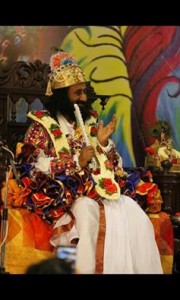The deeper meaning of Janamashtami
The beauty in our ancient stories is that they were never made location-specific or time-specific. Ramayana or Mahabharata are not just events that happened a long time ago, they are happening everyday in our lives. The essence of these stories is eternal.
There is a deeper meaning to the story of Krishna’s birth too. Devaki symbolizes the body and Vasudev symbolizes the life force (prana). When prana rises in the body, joy (Krishna) is born. But the ego (Kamsa) tries to eliminate joy. Kamsa is Devaki’s brother which indicates that ego is born along with the body. A person who is happy and joyful does not create trouble for anyone. It is the one who is unhappy and emotionally wounded who ends up causing disruption. Those who feel injustice has been done to them end up being unjust to others out of their hurt ego.
The biggest adversary of ego is joy. Ego cannot survive and has to bow down where there is joy and love. A person can hold a very high position in society, but he melts in front of his own little child. When the child falls ill, however strong the person is, they feel a little helpless. Ego simply melts when confronted with love, simplicity and joy. Krishna is the epitome of joy, the quintessence of simplicity and the very source of love.
Devaki’s and Vasudev’s imprisonment by Kamsa signifies that when the ego takes over, the body feels like a prison. When Krishna was born, the prison guards fell asleep. The guards here are the senses which protect the ego because they are turned outward when awake. Inner joy sprouts in us when the senses turn inwards.
Krishna is also known as the butter thief. Milk is the essence of nourishment and curd is a cultured form of milk. When curd is churned, butter comes up and floats on top. It is nourishing and yet light, not heavy. When our intelligence is churned, it becomes like butter. When knowledge dawns in the mind, one gets established in one’s Self. Such a person remains unattached to this world and his mind does not sink in it. Krishna stealing butter is a symbolism depicting the glory of love. So attractive is Krishna’s charm and skill that he steals the minds of even the most dispassionate.
Why does Krishna have the peacock feather on his head? A king is responsible for the whole society and that responsibility can become a burden, which sits on the head as the crown. But Krishna fulfills all his responsibility effortlessly, like a game. A mother never feels taking care of her children is a burden. Similarly, Krishna wears his responsibility lightly and plays his roles colorfully, just like the peacock feather on his crown.
Krishna is the most attractive, joyful space within all of us. When there is no restlessness, worry or desire in the mind, you are able to get deep rest. And it is in deep rest that Krishna is born.
The message of Janamashtami is that it is time to bring a wave of joy. Become seriously joyful!
~ Sri Sri Ravi Shankar

